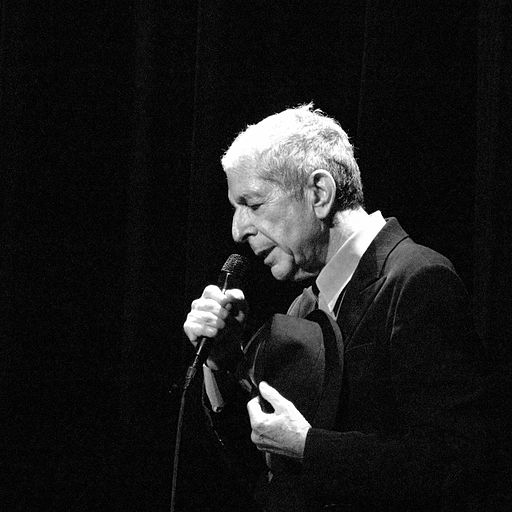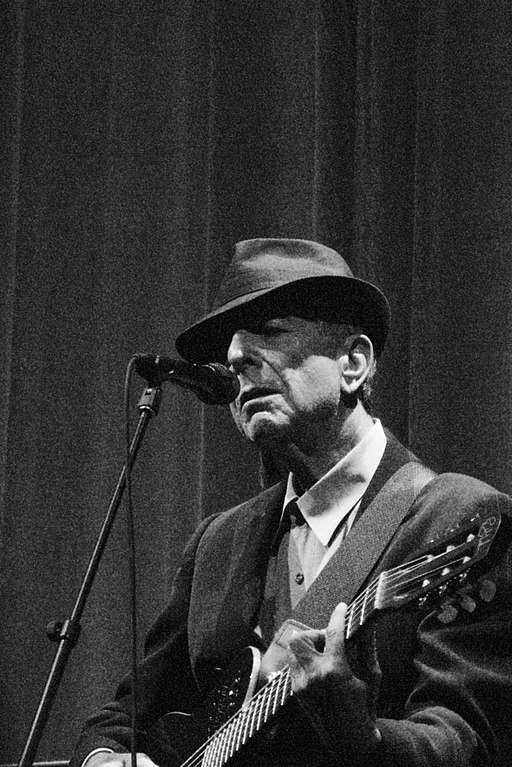Five Songwriting Tips Inspired by Leonard Cohen
Cut the gem and welcome the cracks.

Rama, CC BY-SA 2.0 FR, via Wikimedia Commons
A poet, a brilliant guitarist and composer, an unconventional artist. Leonard Cohen was all of this and more.
His unique approach to songwriting, mostly inherited by a passion for poetry and a natural tendency for deep reflections, gave us legendary songs like Suzanne, Hallelujah, and
I'm Your Man, just to name a few.
His razor-sharp voice, intricate arpeggios, and crystal-clear verses all contributed to the several masterpieces he has released throughout his long career, which abruptly ended with his death, in 2016.
During several interviews, Leonard Cohen highligthed how he did not have a clear songwriting method or approach to teach.
On one of these occasions, he said that being a songwriter is like being a nun, as songwriters are married to a mystery
.
Moreover, he identified his methods as obscure
and not to be replicated
. Yet, his influence on many of us, younger songwriters, is undeniable.
It would be a mistake not to consider his reflections, ideas, and scattered pieces of advice on our craft. In fact, his methods might have been obscure, but his songs and his words are still a great source
of inspiration for a lot of artists.
In this article, I will go through five songwriting tips inspired by Leonard Cohen. Some of them are taken from his contribution to the book
Songwriters on Songwriting, by Paul Zollo. Others are taken from bits and pieces of different
interviews, while most are my own interpretation of Leonard's view.
Are you ready? Let's start with the most important topic: motivation.
Tip #1: Redeem The Day
Leonard once said: Writing begins with an appetite to discover my self-respect. To redeem the day. So the day does not go down in debt.
In other words, it all comes down to an internal appetite, a strenuous demand we place on ourselves to satisfy our thirst and give a deep meaning to our existence.
After all, creating is a human need. It is an attempt at letting go of our ego while actually feeding it, as we create to give meaning to our day, to our life, to our self.
Of course, a great work of art manages to go beyond the concepts of time and self to become universal, but, unfortunately, we don’t know whether this will be the outcome of our writing while we are busy creating.
We can just surrender to our thirst, trying to satisfy it with one more line, one more sentence, one more chord.
This might sound like an abstract, almost philosophical reflection rather than a songwriting tip, but it is more practical and important than you think. It is actually the foundation of our motivation.
It is important to know where our need to write comes from so that we can keep doing it, despite the difficulties, the lack of inspiration, and whatever acts as an obstacle. By letting go of our attachment
to the result, we can focus on the process, and simply redeem our day with a song.
Tip #2: Play With Poetry and With Melody
Leonard Cohen was a great lyricist because of his experience with poetry. In fact, before becoming a famous singer and songwriter, he published a few books.
As a younger artist, he was a well-known poet and writer, who later embraced his musical side.
Nobody could deny his mastery of the art of writing words, but let's not forget his ability to compose evocative, dense melodies to go with them.
By studying Leonard's verses we can grasp one of the most difficult processes in songwriting: the pairing of words and music.
Cohen teaches us that experimenting with poetry can be a great training
in studying the rhythm and the musicality of words. This is why, in my opinion, investing some time in learning poetry forms and techniques, and even having a go at them, can be a great benefit for songwriters,
especially the ones who feel way more comfortable with the musical side of the craft.
After experimenting with poetry, you may notice a better understanding of the natural flow of words. Where are the stresses? How to structure the syllable patterns? What's the role of rhymes? This helps us
finding the melodies we need to create to go with the words.
However, to excel at both poetry and melody-writing, we need to remember another lesson Leonard taught us.
Tip #3: Cut The Gem
We need to cut the gem. What does that even mean?
Leonard Cohen was known for discarding entire verses of his beautiful songs. Loyal to his Buddhist credo, he was too focused on the process to really mind about the outcome and this led him to fearlessly
eliminate a consistent number of words he had already put on paper. One example of this? His famous song Hallelujah is the result of a strict selection. It features only a bunch of verses,
chosen among around a hundred previously written.
The takeaway here is: work hard, write whatever comes to mind, and edit yourself later. You can always cut the gem in a second moment, but you cannot work without enough material.
In the words of Leonard Cohen himself: Before I can discard the verse, I have to write it… I can’t discard a verse before it is written because it is the writing of the verse that produces whatever delights or
interests or facets that are going to catch the light. The cutting of the gem has to be finished before you can see whether it shines.

Rama, CC BY-SA 2.0 FR, via Wikimedia Commons
Move UpTip #4: Take Your Time
The previous tip leads us straight into another one. In order to cut the gem, we need time, as rushing this process means not engaging in it at all.
Actually, one of the very few pieces of advice on songwriting Leonard felt comfortable sharing was this: A song will yield if you stick with it long enough. But long enough is way beyond any reasonable
duration. Sometimes a song has to hang around for a decade or two before it finds its expression.
After all, how can we create something unforgettable if we don’t allow ourselves the time to experiment and fail?
On several occasions, Cohen explained how his approach was more about hard work rather than inspiration. Instead of waiting for a stroke of genius to arrive, he would just sit down and do the work,
one word at a time. So, never be afraid to indulge a little more in writing that verse or finding the perfect chord or melody. Just take your time.
Tip #5: Welcome The Cracks
In his 1992 song Anthem, Leonard offered one of his most beloved and quoted teachings.
By accepting that our creations, as well as our lives and society, are not perfect, we welcome the light, so that we can start working and living again, maybe harder, maybe smarter, or maybe not.
It does not matter, as long as we show up.
I want to end this article with this quote because I find it extremely motivating, especially for those songwriters, and artists in general, who are often captive in the trap of perfectionism.
In Anthem, Leonard sings: Forget your perfect offering. There is a crack in everything, that’s how the light gets in.
So, next time you feel your song is not good enough, see if you can let in some of that light by welcoming that crack. Maybe you can perfect it, turning the crack into a beautiful golden line.
Maybe you can take some more time to explore other ways to deal with it. Or maybe you can just accept it and embrace the fact that even bad songs can be some great training.
Well people, I hope you found these five songwriting tips inspired by Leonard Cohen inspiring enough to get started with your next song.
Don't forget to grab your songwriting checklist for some help in writing it!
Happy songwriting!
Move Up